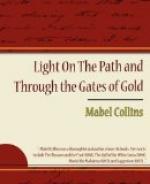IV
One definite lesson learned by all acute sufferers will be of the greatest service to us in this consideration. In intense pain a point is reached where it is indistinguishable from its opposite, pleasure. This is indeed so, but few have the heroism or the strength to suffer to such a far point. It is as difficult to reach it by the other road. Only a chosen few have the gigantic capacity for pleasure which will enable them to travel to its other side. Most have but enough strength to enjoy and to become the slave of the enjoyment. Yet man has undoubtedly within himself the heroism needed for the great journey; else how is it martyrs have smiled amid the torture? How is it that the profound sinner who lives for pleasure can at last feel stir within himself the divine afflatus?
In both these cases the possibility has arisen of finding the way; but too often that possibility is killed by the overbalance of the startled nature. The martyr has acquired a passion for pain and lives in the idea of heroic suffering; the sinner becomes blinded by the thought of virtue and worships it as an end, an object, a thing divine in itself; whereas it can only be divine as it is part of that infinite whole which includes vice as well as virtue. How is it possible to divide the infinite,—that which is one? It is as reasonable to lend divinity to any object as to take a cup of water from the sea and declare that in that is contained the ocean. You cannot separate the ocean; the salt water is part of the great sea and must be so; but nevertheless you do not hold the sea in your hand. Men so longingly desire personal power that they are ready to put infinity into a cup, the divine idea into a formula, in order that they may fancy themselves in possession of it. These only are those who cannot rise and approach the Gates of Gold, for the great breath of life confuses them; they are struck with horror to find how great it is. The idol-worshipper keeps an image of his idol in his heart and burns a candle always before it. It is his own, and he is pleased at that thought, even if he bow in reverence before it. In how many virtuous and religious men does not this same state exist? In the recesses of the soul the lamp is burning before a household god,—a thing possessed by its worshipper and subject to him. Men cling with desperate tenacity to these dogmas, these moral laws, these principles and modes of faith which are their household gods, their personal idols. Bid them burn the unceasing flame in reverence only to the infinite, and they turn from you. Whatever their manner of scorning your protest may be, within themselves it leaves a sense of aching void. For the noble soul of the man, that potential king which is within us all, knows full well that this household idol may be cast down and destroyed at any moment,—that it is without finality in itself, without any real and absolute life. And he has been content in




